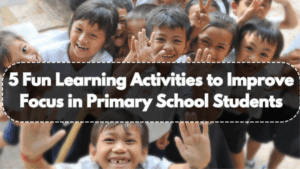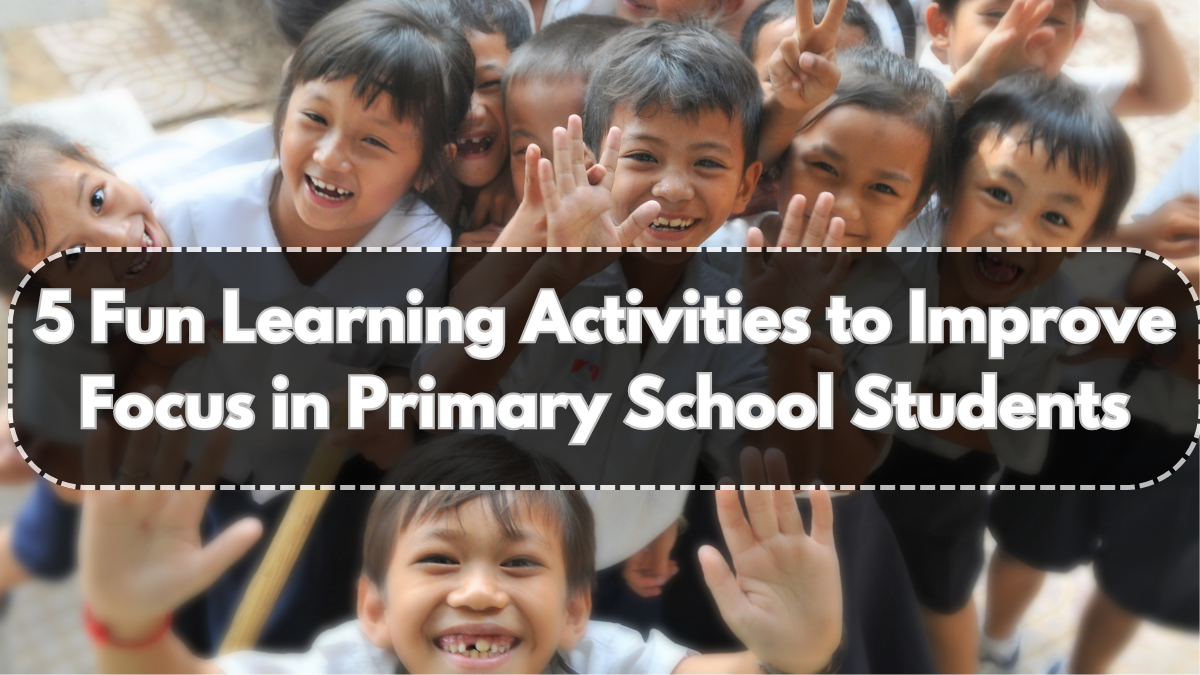Keeping young minds engaged is one of the most crucial yet challenging tasks in any primary school classroom. Children naturally have shorter attention spans, but with the right strategies and engaging classroom practices, their learning focus can significantly improve. Instead of relying on discipline alone, educators are now embracing fun, interactive school activities to help students concentrate better.
These activities don’t just enhance academic understanding—they also build key life skills like patience, active listening, and collaboration. Here are five creative and effective ways to boost focus in primary education through enjoyable classroom tasks.

1. The Silent Ball Game
This simple activity is a classroom favorite for improving concentration and self-regulation. Students stand in a circle and toss a soft ball to each other—but no one is allowed to speak.
How it helps:
-
Encourages eye contact and body language reading
-
Requires full attention and anticipation
-
Helps restless students channel energy constructively
Teachers report that this game sharpens both motor and learning focus skills while keeping the atmosphere calm.
2. Memory Match Cards
In this game, a series of cards are laid face down. Each card has a matching pair, and students take turns flipping two cards at a time to find the matches.
Benefits:
-
Builds short-term memory and concentration
-
Encourages patience and observation
-
Fosters friendly competition in groups
It’s ideal for younger learners and aligns perfectly with interactive primary education techniques.
3. One-Minute Drawing Challenge
Provide each student with a topic (e.g., “a sunny beach” or “a busy market”) and just 60 seconds to draw. The goal is not to create perfect art but to focus quickly and express ideas clearly.
Why it works:
-
Encourages time-bound thinking and quick focus
-
Allows creative expression
-
Reduces anxiety about “getting it right”
Teachers can use this during transitions or as a warm-up to a longer class. It’s one of those school activities that combines fun with focus effortlessly.
4. Story Circle with Distractions
Students sit in a circle. One starts telling a story while another tries to gently distract them with light movements (e.g., tapping fingers, clapping softly). The storyteller must maintain focus and finish their tale.
Skills developed:
-
Improves selective attention
-
Trains students to stay on task despite distractions
-
Enhances oral expression and listening skills
This activity provides a controlled setting to teach learning focus in a real-world scenario.
5. Mindful Breathing Sessions
Even a 2-minute breathing exercise at the beginning or end of the day helps students calm their thoughts and build attention skills.
Key features:
-
Teaches emotional regulation
-
Encourages body awareness
-
Prepares students for focused academic tasks
As part of primary education, mindfulness-based practices are now widely accepted as powerful tools for building better learners.
Table: Focus-Enhancing Activities Overview
| Activity Name | Focus Area | Time Needed |
|---|---|---|
| Silent Ball | Visual attention, self-control | 5–10 mins |
| Memory Match Cards | Short-term memory, patience | 10–15 mins |
| One-Minute Drawing | Time focus, creativity | 5 mins |
| Story Circle with Distractions | Selective focus, verbal skills | 15 mins |
| Mindful Breathing | Emotional regulation, calm | 2–5 mins |
Each of these school activities is designed to be low-prep and high-impact, making them perfect for any classroom setup.
FAQs
How can I help my child improve learning focus at home?
Use simple games like puzzles, memory cards, or timed tasks that require attention. Limit screen time and incorporate short mindfulness exercises.
Are fun activities effective in improving focus?
Yes. Fun, interactive school activities reduce stress and increase engagement, making it easier for children to focus naturally.
What is the role of primary education in developing focus?
Primary education sets the foundation for cognitive and emotional skills. Activities that build attention and patience at this stage benefit long-term learning.
How often should teachers use focus games?
Incorporating at least one learning focus activity daily or during transitions can significantly improve classroom attention over time.
Can focus-building games replace traditional teaching?
No, but they are excellent supplements. These games support core lessons by improving the underlying attention skills students need to succeed academically.
Click here to know more.
